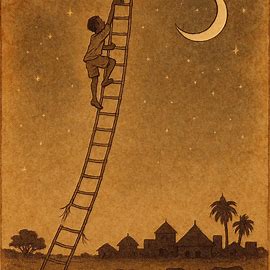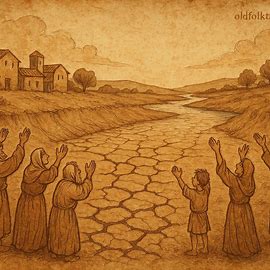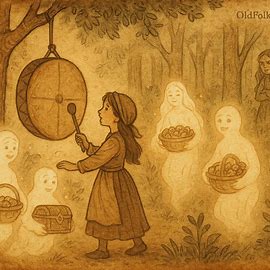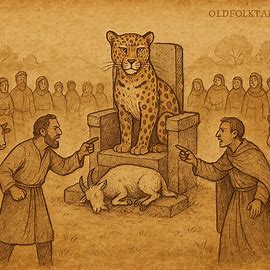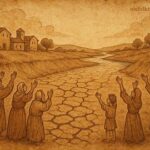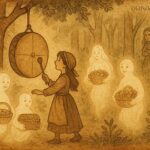Long ago, in a quiet village on the open plains of Sudan, the children would gather around the fire to hear the words of an old herdsman. His voice carried the weight of generations, and his eyes reflected the mystery of the skies above. One night, under a glowing crescent moon, he told them a story that linked the cattle of the earth with the horns of the heavens.
“The Moon,” the herdsman began, pointing upward, “is not always full. Each month she borrows horns from the cattle that graze upon our land. When she wears them proudly, she grows bright and round. And when the horns return to their rightful place, the Moon fades back to her slender shape, waiting for the time to borrow again.”
The children gasped and whispered among themselves, gazing at the night sky as if they could see the invisible exchange. Among them sat a boy named Lado, known for his restless curiosity. He often asked questions that others dared not, and though his spirit shone bright, it sometimes led him into trouble.
Lado could not let the story rest. “If the Moon borrows horns from our cattle,” he thought, “then perhaps I too could take them before she does. Imagine the honor of wearing the Moon’s horns, of shining in the night sky!”
That night, he lay awake beneath the stars, planning how he might reach the heavens. His heart beat with excitement, and his imagination painted visions of himself crowned with lunar horns, admired by all the villages across the plains.
READ THIS: The River That Moved: A Sudanese Folktale That Teaches Lessons on Respect and Gratitude
The following day, while the cattle grazed near the river, Lado set about his task. He gathered long ropes made from twisted reeds and vines. Patiently, he tied them together, knot after knot, until he had fashioned a ladder that seemed to stretch endlessly toward the sky. Villagers who passed by chuckled at his efforts, thinking it was one of his boyish games. But Lado worked with determination, ignoring their laughter.
When the sun sank below the horizon and the Moon rose, slender yet glowing, Lado carried his ladder to the clearing. “Tonight,” he whispered, “I will climb and seize the horns before she takes them.”
He set the ladder against the night and began to climb. Higher and higher he went, his hands burning from the rope, his breath growing shallow. Below, the village became small and distant, while above, the Moon seemed closer with every step. The world was silent except for the beating of his heart and the creak of his rope ladder.
But the Moon, watching from her place in the heavens, knew the boy’s intent. She shook her silver head and whispered through the night wind, “What belongs to the heavens must not be stolen by the earth.”
The ropes trembled. The knots loosened. Suddenly, with a sharp snap, the ladder broke. Lado fell, tumbling through the sky, his cry echoing like a bird lost on the wind. Yet he did not vanish entirely. Where he struck the darkness, a new star appeared, burning faintly but steadily.
The villagers who saw the light wondered at its sudden presence. The herdsman raised his staff and declared, “Lado has become a warning in the sky. His star will forever remind us that no one may take what is not meant for them. Curiosity is good, but greed for the heavens brings only a fall.”
From that day, when children gazed upward at the star that shimmered softly near the horns of the Moon, they remembered Lado’s story. And the old herdsman would end his tale the same way each time: “The horns belong to the Moon, not to us. Let them rise and fall with her, for the heavens are not ours to claim.”
Moral Lesson
This tale teaches that curiosity, while a gift, must be guided by respect and humility. The boy’s boldness to climb toward the sky reflects the human desire to reach beyond limits, but his fall reminds us that some boundaries exist for a reason. The horns of the Moon are symbols of mysteries greater than ourselves, mysteries that belong to the heavens and not to humankind.
In life, ambition can lead to growth, but unchecked desire, especially for what is not rightfully ours, can bring ruin. The story warns us not to covet the unreachable, but to honor both the wonders of the earth and those of the sky.
Knowledge Check
Q1: Who told the story of the Moon’s horns to the children?
A wise old herdsman in the village.
Q2: What did the herdsman say the Moon borrowed each month?
He said the Moon borrowed horns from the cattle of the earth.
Q3: Why did the boy Lado want to climb into the sky?
He wanted to steal the Moon’s horns and wear them himself.
Q4: What happened when Lado’s ladder of ropes broke?
He fell from the sky and became a star.
Q5: What does Lado’s star symbolize in the folktale?
It symbolizes a warning against greed and coveting what belongs to the heavens.
Q6: What is the main lesson of this Sudanese folktale?
That curiosity must be tempered with respect, and one should not seek to take what is beyond human reach.
Source: Sudanese folktale, collected among the Bari people by Frobenius, 1923.
